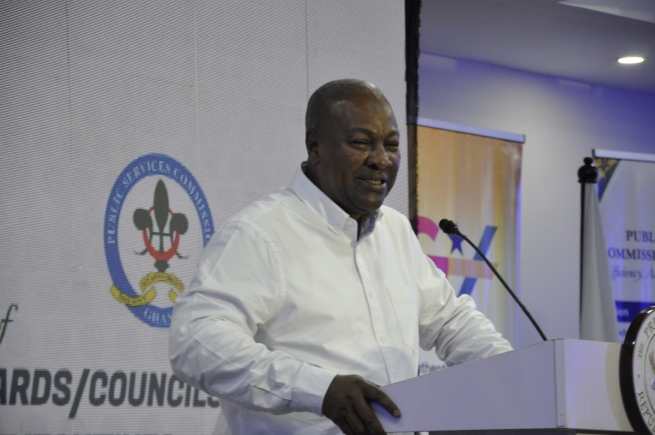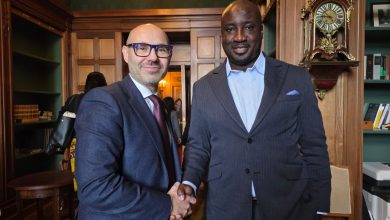
President John Dramani Mahama has directed that persons found culpable in the misuse or misappropriation of public funds should be prosecuted under a fast-track judicial process to serve as a deterrent to others.
He said the annual ritual of the Public Accounts Committee (PAC) of Parliament sittings to expose financial irregularities and mismanagement across public institutions must come to an end through effective enforcement and accountability.
The President, who was speaking at the opening of the 12th Annual Conference of Chairpersons of Governing Boards and Councils, Chief Directors, and Chief Executives of the Public Services of Ghana in Ho, the Volta Regional capital, said it was “pathetic” that the country continued to record reckless use of public resources every year.
“I have a meeting on Thursday with the Chief Justice, the Attorney-General and others to find a final solution to this Auditor-General’s report.
Persons who are found guilty of infractions leading to the loss of public resources must have a fast-track process to Nsawam,” he said.
President Mahama stressed that until there was a deterrence, the Auditor-General’s reports would continue to reveal staggering losses, noting that the latest figures showed misappropriations and infractions amounting to about GH¢15 billion.
“If we saved GH¢15 billion, can you imagine what it could do for our nation?” he queried.
The President lamented that though every department was required to set up Audit Report Implementation Committees (ARICs), “virtually nobody followed up on recommendations,” thereby weakening the accountability chain.
He, therefore, hinted at a new system to ensure that recommendations from the PAC were implemented swiftly and offenders held responsible.
The four-day conference, organised by the Public Services Commission (PSC), is on the theme: “Strengthening Public Sector Leadership and Governance to Enhance Service Delivery.”
It brings together heads of public institutions to review strategies for efficiency, leadership and integrity in the public service.
Resetting governance, accountability
President Mahama said the conference came at a critical time when the country must “reset governance” by restoring efficiency, professionalism and integrity in the public sector.
“When I speak of a reset, it’s not mere sloganeering. It’s a solemn call to action — to restore the fundamentals of governance, rebuild public trust and re-adjust our institutions to serve citizens with fairness, transparency and purpose,” he stated.
The President emphasised that development could not be achieved through political will alone but required “a capable, ethical and empowered civil service” that implemented policies with innovation and responsibility.
HR system
The President also announced a directive for all public service institutions — whether subvented or non-subvented — to integrate into the Human Resource Management Information System (HRMIS), describing it as the “single authoritative source of personnel data.”
“I can’t understand why in the 21st century, the government does not have a proper database of people it employs. This fragmentation has caused inefficiencies, data inconsistencies, and reduced oversight.
It’s also why ghosts come out of their graves and take money from our Accountant General’s Department,” he said.
The integration, the President explained, would enhance transparency in recruitment, promotions, remuneration and retirement processes, and ultimately eliminate ghost names from the public payroll.
Touching on its relation to productivity, President Mahama bemoaned the weak link between performance and rewards in the public sector, where “the lazy one and the hardworking one get the same.”
He disclosed that the Ministry of Finance, the Fair Wages and Salaries Commission and the PSC had developed a Pay-for-Performance and Productivity Framework to be piloted from January 2026 to institutionalise a culture of accountability and measurable outcomes.
On gender parity, President Mahama reaffirmed the country’s commitment to achieving the benchmarks set under the Affirmative Action Gender Equity Act, 2024 (Act 1121), which mandates 30 per cent women in leadership by 2026, 35 per cent by 2028, and 50 per cent by 2030.
The President advocated that more women be included on public service boards and councils, saying they are as capable as men for those duties.
“Just looking at this room alone, the testosterone is overwhelming,” he quipped, calling on all boards and institutions to ensure gender-balanced representation in line with the law.
He hailed the elevation of Professor Naana Jane Opoku-Agyemang as the country’s first female Vice-President as a “historic and symbolic milestone,” representing confidence in women’s ability to lead at the highest levels.
President Mahama said it was often very embarrassing inaugurating all-men boards of public institutions, although there were women of substance who could also serve with competence on such boards.
The President pointed out that affirmative action was no longer a bill but it was now a law, to which all and sundry must comply.
24-hour Economy, integrity
President Mahama also highlighted progress on the 24-hour Economy programme, describing it as a “cornerstone” of his administration’s transformation agenda to create a productive, value-added and globally competitive nation.
He said the initiative — which comprised Grow24, Make24, Aspire24, and Fund24 — was to generate over 1.7 million jobs in four years and shift the economy from raw material dependence to industrial and service-based growth.
“I commend agencies like the Passport Office and the Ports and Harbours Authority that have already integrated the 24-hour Economy into their operations even ahead of the passage of the Authority’s Bill,” he said, urging other public institutions to follow suit.
President Mahama called for honesty, diligence and adherence to laid-down procedures in the discharge of public duties.
“We have seen cases where people have run those establishments like they were their own property. It belongs to the people of Ghana, and they appointed you for a period of time.
“When you leave office, you must be able to hold your head high, wake up in the morning and not fear that anybody will call you to come and account,” the President said.
Chairman of PSC
The Chairman of the Public Services Commission, Prof. Victor Kwame Agyeman, said the government’s commitment to promoting excellence and effective leadership in the public service signified the commencement of the successes of the resetting agenda.
He gave an assurance that the public service would throw its weight behind the resetting agenda and work diligently to clear the trust deficit and institutional fragility in public institutions.
The Presidential Advisor of the 24-Hour Economy and Accelerated Export Development, Goosie Tanoh, said performance in the public sector depended on design and recruitment.
For that matter, he said, leaders in the public sector must be digitally compliant.
Mr Tanoh said it was crucial to cultivate the analytical capabilities and close gaps between institutions to boost productivity.
He said the initiative would also help to convert various economic interventions into bankable investment projects.
Work diligently
The Agbogbomefia of Asogli, Togbe Afede XIV, who chaired the opening ceremony, said public institutions could only make rapid progress if their leaders worked diligently, with honesty and transparency.
“This is a time of change, inspired by the demand for better management of state resources, and that means the truth must be our hallmark,” he stressed.
Some retired public service workers were honoured at the opening ceremony.



